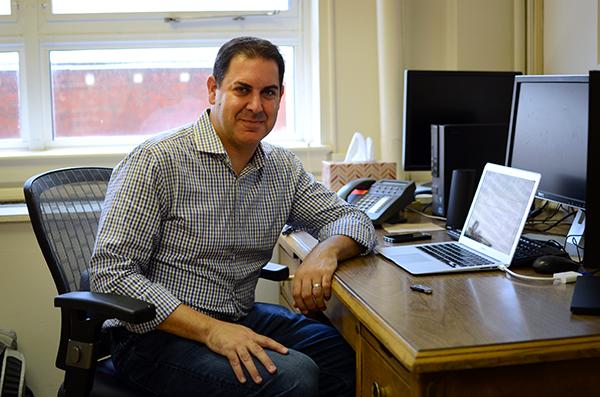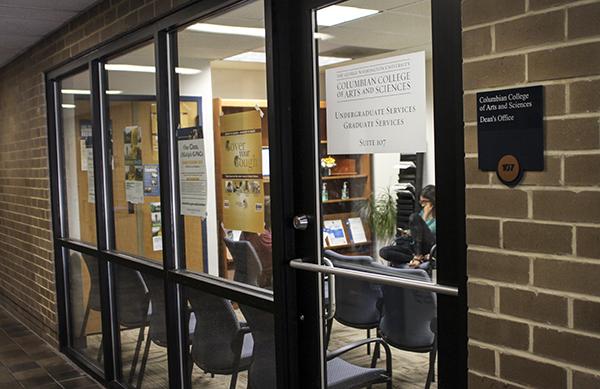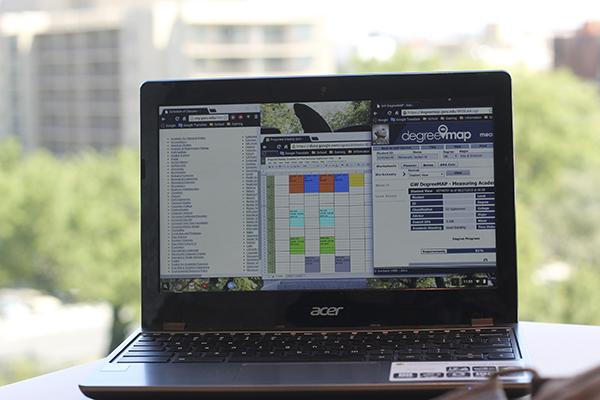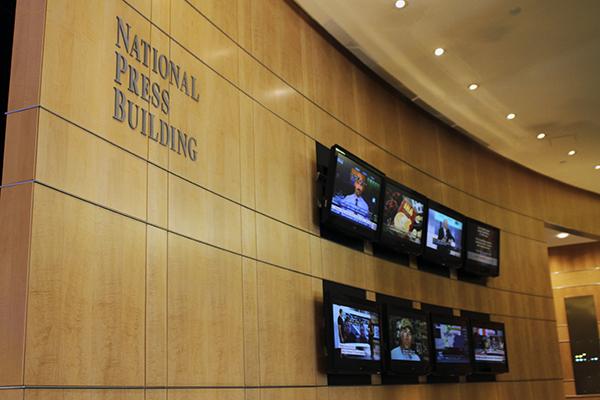These four new professors won’t just teach from the book — they’ll teach from their own experiences too.
Stephen Mitroff
Department: Psychology
Courses: Science in the District, Cognitive Psychology
When not using psychology to improve baggage security at airports, Stephen Mitroff will also be teaching psychology courses at GW.
Mitroff, who also taught at Duke University for a decade, has been working with the Transportation Security Administration in D.C. for the last two years to help train TSA agents to spot potentially dangerous objects in luggage more efficiently.
He said he plans to incorporate his previous work into his classes at GW, especially a Dean’s Seminar in which he plans to take students to the TSA headquarters and other psychology research facilities around D.C. to learn about visual search.
Mitroff’s lab specializes in visual searches — he uses psychology to study someone’s ability to search for and find targets. His research applies to everyone from exterminators looking for termites to military personnel searching for suspects. The searches have “a lot of real-world implications,” he said.
“Mistakes can often be deadly so we’ve been focusing a lot of work on understanding how to improve performance,” Mitroff said.
Mitroff has even researched improving performance by using video games. In 2014, he partnered with the creator of a smartphone game called “Airport Scanner,” in which players had to identify and tap on prohibited items on a simulated airport X-ray machine. Mitroff used the data to determine that people would get distracted by multiple prohibited items, or that they would miss uncommon ones.
While at Duke University, Mitroff also studied how special eyewear, which creates a strobe light effect for those who wear it, improved the performance of professional hockey players on the Carolina Hurricanes.
Jeff Goodman
Department: LGBT Health Policy and Practice program
Courses: LGBT Health Capstone Project
Jeff Goodman was once a student in GW’s LGBT Health Policy and Practice program for graduate students. Now, he’s one of its instructors.
After being in the first group of students to complete the Columbian College of Arts and Sciences program two years ago, Goodman became a co-instructor. Over the summer he was named a core faculty member and a lecturer.
In the 1980s, while living in New York City’s East Village, Goodman became involved in activism against the AIDS pandemic that affected the LGBT community. After people close to him became infected with AIDS, Goodman joined the advocacy group “ACT UP,” which sought to promote research and medical treatment of the disease.
“Seeing people who yesterday were just like me — today they are skeletons and tomorrow is their funeral — that caused such cognitive dissonance in my head and the government was ignoring it,” he said. “I joined ACT UP and they radicalized. If it meant closing down a bridge or getting arrested, oh, absolutely fine.”
After working in entertainment until the late 1990s, Goodman returned to activism and turned to a career in public health because he felt that national LGBT health policies could still use improvement.
“When I would go to my doctor’s office and I would see people around me who were still sick, who didn’t have the same quality of insurance I did, that brought me back to public health,” he said.
Goodman, who lives in Los Angeles, is a consultant for public health departments and clinics. He serves as the chair for the D.C.-based Society for Public Health Education and the American Public Health Association.
Joshua Glazer
Department: Graduate School of Education and Human Development
Courses: Policy Design: Accountability in Education
For Joshua Glazer, who has taught as a visiting professor at GW since 2012, becoming an associate professor in the Graduate School of Education and Human Development is a chance to become more involved this semester.
“It was great to be a visiting professor, but it’s a little bit like being the house guest,” he said. “It’s nice to visit, but at some point you’re not really part of the family.”
Glazer, who will be teaching education policy to master’s and doctoral students, has spent his career researching how to improve schooling in impoverished communities in the United States — although he had originally planned to leave his job as a middle school teacher to pursue a Ph.D. in political science.
When a dean at one of the schools he applied to recommended that Glazer study education instead, he took the advice and later attended the University of Michigan.
“I became involved with people who were really committed and passionate about policy and reform, and I started on that path and never looked back,” he said.
Before coming to GW, he spent seven years living in Tel Aviv as a program officer and director for the Rothschild Foundation, a philanthropic organization that aims to improve the Israeli education system. Bringing in those other ideas helps students make comparisons, he said.
“One of the hard things about teaching about our education system is like it’s trying to teach fish to see the ocean. It’s all we know, so it’s very easy to just assume that’s the way it is,” he said.
Alexander van der Horst
Department: Physics
Courses: Origins of the Cosmos
Alexander van der Horst will begin teaching as a physics professor this fall, but his background in astronomy involves more than just science and math. Originally from the Netherlands, van der Horst, who attended the University of Amsterdam, said his interests in astronomy and physics date back to his childhood.
“From a very young age I was always reading about it. I was always going to astronomy clubs on Saturday mornings,” he said. “I just had this one goal. That was go to university and study astronomy.”
And his students won’t just be reading textbooks — van der Horst will also try to share his experiences from his four years of experience at NASA, where he worked as a researcher on a team that monitored a gamma ray instrument used on a satellite.
“I’m interested in things that go ‘boom’ with the universe, so really kind of the most extreme objects in the universe,” he said. “Things like very massive stars that explode at the end of their lives, black holes.”








